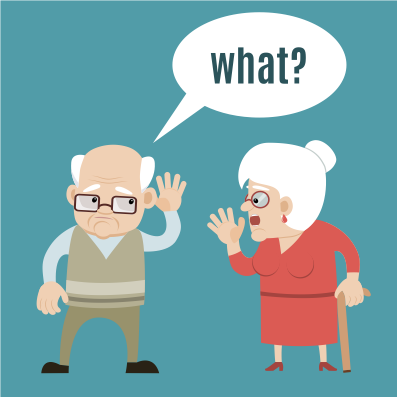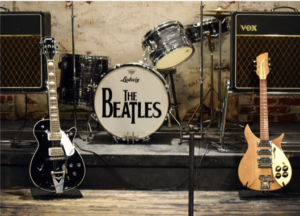Pardon Me? – The Importance of Hearing Aids

We’ve all been there. We know what it feels like. You are having a conversation with someone (whether in a noisy restaurant or in the quiet of your own home), and you miss what they just said. A polite “Pardon me?” prompts them to repeat that last sentence. But it too sounds garbled. As does the next attempt to repeat it. Your heartbeat picks up a few paces, and you get that prickly, flushing feeling in your face. You are left with two (equally unappealing) options. The first is to just pretend you heard what was said, with the very real possibility that you might say something stupid or completely out-of-step with the conversation. And the second is to ask for a further repetition, which could easily lead to the sentence being shouted at you, slowly, word by painful word (embarrassing!!) or, even worse, your conversation partner giving up with the dreaded “Forget it.”
The third option, of course, is one we rarely think of. And that is to make an appointment with an audiologist to have your hearing examined. It may be that a few lapses of hearing are nothing to worry about. But it also may indicate the early stages of hearing loss. Emerging research has identified a link between hearing loss and dementia – one that has intrigued researchers and professionals alike, and has spawned a flurry of follow-up studies designed to delve deeper into this relationship.
The facts are now well-accepted – mild hearing loss doubles the risk of developing dementia, while moderate hearing loss triples that risk, and severe hearing loss increases the risk almost five-fold. Studies have detected shrinkage (or ‘atrophy’) of the brain in those suffering from hearing loss, especially affecting areas of the brain responsible for communication and memory. While the association of hearing loss and dementia is indisputable, what has yet to be understood is whether there is a causal link between the two. Does hearing loss cause dementia or vice versa? Or are hearing loss and dementia separate outcomes from other conditions? Certainly not everyone with hearing loss suffers from dementia, and not all cognitively declining persons have deteriorating hearing. My own grandmother (who was sharp as a tack throughout her life) presided over the dinner table with a serene smile on her face, without hearing a single word spoken the entire meal. And every so often, her circa-1970s hearing aid would let off a squealing buzz.
Several theories have attempted to explain how untreated hearing loss might impact a brain’s healthy functioning or accelerate dementia. One theory suggests that a brain that is trying to process auditory input that is difficult to understand diverts neural resources from other cognitive tasks. Specifically, if the brain is struggling to make sense of what it is hearing, it may have less cognitive bandwidth to understand the context of the conversation or even remember it. The brain is often compared to a muscle which needs constant movement to stay fit. All areas of the brain need to remain active to stay vibrant and healthy; otherwise they will atrophy.
A second theory points to how hearing loss undermines a person’s conversational confidence and often leads to social isolation. Social interactions are like a gymnasium for the brain, providing multiple sources of stimulation and requiring one to continually evaluate and respond to what is being said. Disengaging from one’s family or peers denies the brain those opportunities to function, thereby increasing the chances of atrophy.
So, what can be done to mitigate the dementia risk that those with impaired or declining hearing face? The most obvious treatment is to invest in hearing aids. Studies are currently under way, analyzing whether hearing aids can slow or prevent the onset of dementia. Early data is showing promising results. But the answer is likely to be complex, as enhancing one’s hearing would have a myriad of potential benefits beyond the strictly neurological outcome of allowing the brain to function in a more holistically healthy manner. Being able to re-engage socially and rediscovering relationships from which one may have withdrawn, are enormous boosts that have immeasurably positive impacts on psychological and cognitive health.
Many seniors drag their feet when it is suggested they purchase hearing aids. Some think back to the clunky hearing aids of my grandmother’s era, with their telltale static buzzing. But technology has innovated a new generation of hearing aids that are effective, unobtrusive and virtually invisible to others. To be sure, the cost can be daunting. But consider it an investment with limitless upside. And while researchers are busy investigating the extent of that upside, don’t let yourself be left behind. Your family, friends, and likely your brain, will thank you for it!
Stay well and stay connected,
Amy Lewtas, Founder of RetroSparX
New to RetroSparX
We are pleased to announce the following new RetroSparX memory game units which have recently been released and can be found on our website (www.retrosparx.com). We invite you to delve into the topics and tackle the memory games for seniors that comprise each unit. And we wish you happy reminiscing while you recall, relive and revel in these moments.
Relive North America's Introduction to the Beatles

When North American audiences were first treated to the the Beatles on the Ed Sullivan Show in 1964, no-one could have predicted the explosive success that would follow the Fab Four in every iteration of their musical careers. Read about this extraordinary group and the kickstart that it gave to the rock ‘n roll movement.
Included memory games for seniors
- In Twist and Shout, rediscover the titles of some of the Beatles’ most enduring hits by unscrambling words. We dare you not to sing while spinning these tunes in your head.
- Select from a list of words to complete phrases or titles that contain the words “rock” or “roll” in Rolling Off Your Tongue.
Revel in the Arrival of the Mini Skirt

Remember putting on a mini skirt for the first time? You may not have realized that you were engaging in a gesture of youth empowerment and sexual revolution. You may have just thought it looked terrific and deliciously trendy! Read about this ‘skimpy’ garment, and the deep social impact it had. (By the way, we are sure you looked great!)
Included memory games for seniors
- Complete a crossword in Chic Criss – Chic Cross of fashion trends, styles and designers that defined the decades of the 20th century.
- In Sounds of Style, unscramble letters to find the word that both completes a word or phrase from the world of fashion and begins a second, similarly stylish, word or phrase.



Comments